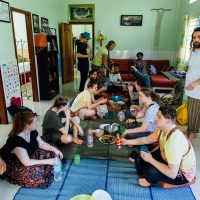| Have you seen advertisements of how you can learn a language in one week? We are not sure whether to laugh or cry when we see phone apps or learning methods that make such promises. Sure, you can pick up some phrases and speak enough to order a meal and find a toilet in a week, but learn a language and find out enough about a culture to not cause offense, takes quite a lot longer. Being able to understand and speak the language of the Khmer people where we live has been a major priority of our first couple of years living in Cambodia. There really is no other way to live in a respectful and understanding way than to learn the language and the culture of the community where you live. This is what happens when we are born into a family and grow up in a community. Thankfully the method that we employ in our language and cultural learning is modelled on how we naturally learn as a child. As we have struggled to remember words and how to put them together to be understood, at times we have felt a lot like babies. We have even experienced feeling a little jealous of actual Khmer babies who don’t have a lot of expectations on them as they learn.
As we learn the Khmer language, we learn Khmer culture. Language is not separate from the way of life (culture) that it supports, activities of the people and their relationships. Rice is a really big part of life in Cambodia. Most of the population still live in the country areas and many grow rice; everyone eats rice 2 or 3 times a day. It is often the first words of a conversation “Have you eaten rice yet?”. Before coming to Cambodia, we only knew one word to describe the plant or the end result of cooking the grain that is eaten: ‘rice’. The Khmer have a word for rice when it is growing, they have another word for the harvested grain with the husk still attached; another word describes the grain after it is milled to remove the husk and finally a different word is used to describe the grain after it is cooked. Respect is another facet of Khmer culture that influences the language. Back on the subject of eating, we can’t think of too many English words for ‘eat’, but the Khmer have a different word for ‘eat’ relating to age and status. An animal eating food is described with a different word to an average person. A young person generally has a different word for ‘eat’ than an old person and monks and kings both have a different word to describe what they do when they ‘eat’. It can be an insult to use the word for an animal eating in the wrong context. To learn a language should involve growing into the life-world of host people and their communities.
A privilege that we have found in our language and cultural discovery here in Cambodia has been that the people who help us learn are so much more than language teachers. We choose to call them nurturers for the reason that our learning is nothing like a traditional student-teacher relationship. They invite us into their world, their relationships, family, celebrations, the way they think and why. Together we grow into our hosts life and culture as we participate in it. Our nurturers are special people; they are not trained in education, but were chosen as people who lived nearby to where we live and are flexible enough to walk with us in our learning while they live their life in the same community and help us to learn enough to participate in our community. Thankfully we are surrounded with a community of people who are patient enough with our mis-pronunciation of words and misunderstandings. Amazingly we are treated with so much respect and honour, just for our efforts to speak their language and learn about their culture. We also have a wider team who support us and we seek to support as we work together to engage in this different culture to our home country and desire to bring wellbeing, completeness and wholeness into people’s lives.
In the past week the school principal in the school where Rob volunteers came over and said in perfect English “hello friend” (normally all of the conversations are only in Khmer). It was very heart warming to hear such generous words in a language that Rob has heard spoken all his life. It is such a privilege to have begun the journey of speaking the words of another person’s birth language and know that this also brings them joy and opens their hearts in such a way. |







